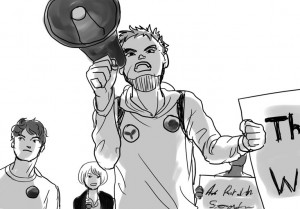College students are in a position to go green
Fighting climate change as a college student can mean anything from tracking down the lone recycling bin in your dorm to buying a Prius to simply signing whatever environmental petition happens to be circling campus that day.
Of course, some students take it a step further.
This weekend, college students from across the nation will congregate in Washington, D.C. for the Energy Action Coalition’s annual Power Shift Conference. Here, students will learn about green jobs, clean energy and the most efficient ways of implementing clean energy resources on college campuses.
The conference, which focuses specifically on fighting climate change, will draw some 10,000 students — including at least one from USC.
Tony Guan, a junior majoring in philosophy, politics and law and an intern for USC’s Beyond Coal Campaign, said he signed up for the D.C. trip because he feels he will learn the leadership skills necessary to help expand the movement against climate change at USC.
Guan and his fellow climate-conscious students will participate in what the Power Shift website describes as a four-day clean-energy “boot camp.” The group will listen to such renowned speakers as Al Gore and will wrap up the trip to D.C. with a massive rally at the capitol building.
“It’s an incredible way to network with other students and see what we can each be doing at our own campuses,” Guan said. “Not enough is being done [to fight climate change] at USC right now, so things like this help raise awareness and student participation.”
He makes a valid point. The Beyond Coal Campaign, for example, has convinced 16 universities across the country — from Case Western Reserve University to Cornell University, and most recently Miami University of Ohio — to go coal-free.
But according to Henry Symons, USC’s Beyond Coal Organizer for the Sierra Club, the university is still not coal-free and currently has no plan or timeline to become so.
This is where student participation comes in.
“The most effective method for students is to actually work locally in the area where they have the most political power,” Symons said. “That means on university campuses … Students have a tremendous amount of power there.”
This year alone, USC’s chapter of the campaign has collected 2,500 signatures on a petition for the campus to go coal-free. Symons believes if this continues, it will not only make the issue increasingly difficult for the USC administration to ignore, but will also educate people and emphasize the role college students can play in clean-energy reform.
The bottom line is college students are among those with the most potential to influence energy policy, whether on campus or on the national level.
Conferences like Power Shift highlight the unique position the college student demographic holds in the push for energy reform.
Campuses use incredible amounts of energy and seem ideal for clean-energy innovation.
Most of all, universities facilitate the convergence of brainpower necessary to fuel a conference like Power Shift.
USC might not be the greenest university, but that only means organizations such as the Beyond Coal Campaign and the Sierra Club are looking for students with fresh ideas, and that conferences like Power Shift are ready to educate students looking to move our own campus forward.
Why not take advantage of that?
Kastalia Medrano is a sophomore majoring in print and digital journalism and an associate managing editor for the Daily Trojan. Her column, “Green Piece,” runs Tuesdays.

